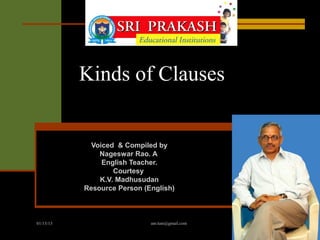Kinds of clauses
•Transferir como PPT, PDF•
4 gostaram•2,291 visualizações
Useful for IX CBSE students. Strictly made according to PSA syllabus.
Denunciar
Compartilhar
Denunciar
Compartilhar

Recomendados
Mais conteúdo relacionado
Mais procurados
Mais procurados (19)
Diploma engg iv u-1.3 simple, compound & complex sentences

Diploma engg iv u-1.3 simple, compound & complex sentences
L#5 sentences which cannot be changed into passive voice

L#5 sentences which cannot be changed into passive voice
Destaque
Destaque (20)
What’s the difference between an adjective clause and

What’s the difference between an adjective clause and
Semelhante a Kinds of clauses
Semelhante a Kinds of clauses (11)
Types of Sentence|| Simple || Compound || Complex Sentence ||| Grammar Series...

Types of Sentence|| Simple || Compound || Complex Sentence ||| Grammar Series...
Mais de Sri Prakash Vidya Niketan
Mais de Sri Prakash Vidya Niketan (20)
ఏ ఏ సందర్బాలలో ఇంగ్లీష్ లో ‘Say’ ‘tell’ ఉపయోగించాలి.

ఏ ఏ సందర్బాలలో ఇంగ్లీష్ లో ‘Say’ ‘tell’ ఉపయోగించాలి.
Kinds of clauses
- 1. Kinds of Clauses Voiced & Compiled by Nageswar Rao. A English Teacher. Courtesy K.V. Madhusudan Resource Person (English) 01/15/13 anr.tuni@gmail.com
- 2. A clause is a combination of words which has a subject and a predicate, but which is a part of sentence. You can drive my car as long as you drive cautiously. In the above sentence “as long as you drive cautiously” is a part of a larger sentence and does not give a complete meaning it self. It depends upon the clause “You can drive my car” to give a complete meaning. The above sentence has two types of clauses. They are Principal Clause and Subordinate Clause. 01/15/13 anr.tuni@gmail.com
- 3. A clause which stands by itself and makes a complete sense is called Principal Clause or Main Clause or Independent Clause. A clause which cannot stand by itself and cannot make a complete sense is called the Subordinate or Dependent Clause. Dependent Clauses act in three different ways. Adjective Clause (Relative) Adverb Clause Noun Clause. 01/15/13 anr.tuni@gmail.com
- 4. Adjective Clause: An Adjective Clause is a dependent clause that acts as an adjective. They are introduced by special words called relative pronouns or relative adverbs. The woman who looked happy danced. ‘who looked happy’ is a dependent clause, whole clause is functioning like an adjective modifying the noun ‘woman’. 01/15/13 anr.tuni@gmail.com
- 5. An Adverb Clause is a dependent clause that acts as an adverb. They are introduced by special words called ‘subordinating conjunctions’. I come to see you because I love you. ‘Because I love you’ is a dependent Adverb Clause, the whole clause is functioning as an adverb modifying the verb ‘come’. While I was crossing the busy road, I saw Mohan. No sooner did the teacher enter the class, all the students stood up. 01/15/13 anr.tuni@gmail.com
- 6. A noun clause is a dependent clause that acts as a noun. Sometimes, these are introduced by special words called Noun Clauses. Whatever you want is fine with me. ‘Whatever you want’ is dependent clause that acts as the subject of the sentence. It seems that he is a fool. 01/15/13 anr.tuni@gmail.com
- 7. Visit us at “ayalasomayajula nageswar rao” For More videos on Functional & Usage Grammar. 01/15/13 anr.tuni@gmail.com
